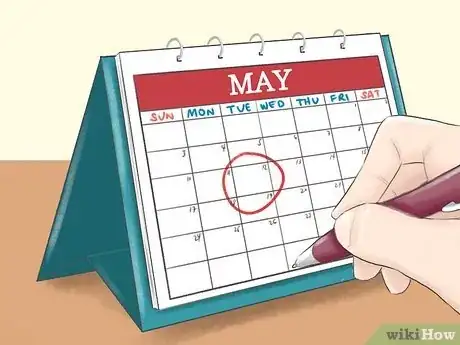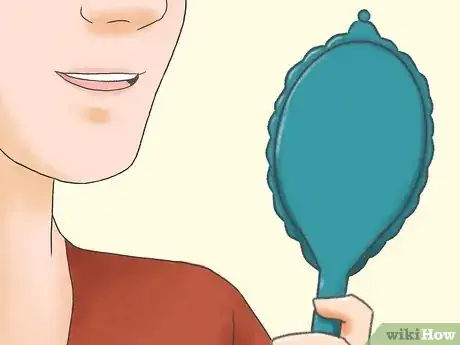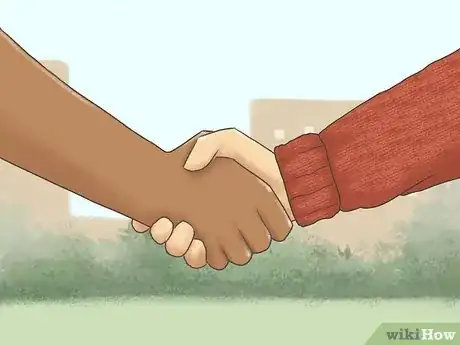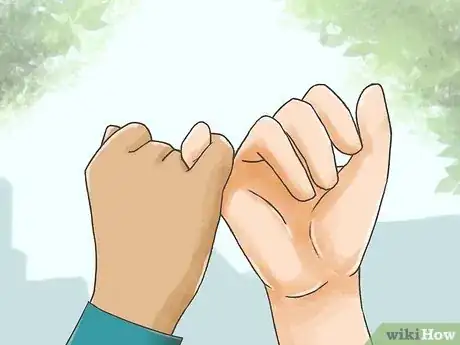This article was co-authored by Klare Heston, LCSW. Klare Heston is a Licensed Independent Clinical Social Worker based in Cleveland, Ohio. With experience in academic counseling and clinical supervision, Klare received her Master of Social Work from the Virginia Commonwealth University in 1983. She also holds a 2-Year Post-Graduate Certificate from the Gestalt Institute of Cleveland, as well as certification in Family Therapy, Supervision, Mediation, and Trauma Recovery and Treatment (EMDR).
There are 11 references cited in this article, which can be found at the bottom of the page.
This article has been viewed 22,453 times.
Has your best pal gained a new friend or date, making you feel like you’ve ceased to exist in their world? Or, possibly your once strong bond seems to have weakened over time — your friend has no qualms about spilling your dirt and hardly ever keeps in touch. All relationships are marked by highs and lows, but it can feel upsetting when a friend betrays or neglects you. Learn how to talk to your friend about these feelings by first addressing the emotional impact of betrayal, having a candid discussion with them, and working together to build a stronger bond.
Steps
Coping with Betrayal or Neglect
-
1Consider if you are overreacting. It can be hard to swallow, but sometimes we feel betrayal or neglect due to overthinking or oversensitivity. Carefully weigh the context of what’s happening in your friendship before deciding what to do.
- Reflect on the evidence. Is there some other way to describe your friend’s behavior? Are they overwhelmed with work? Have they been sick?
- Consider your own state of mind. Are you going through a difficult time, and could that be clouding your judgement or perception when it comes to your friend's behavior?
- Get a second opinion. Would someone else react the way you are?
-
2Release your emotions in a healthy way. Betrayal and neglect can lead to painful emotions, so it’s a smart idea to effectively express them. Holding in your pain can cause a blow up in your friendship later. Take some time before confronting your friend to let the dust settle and get your emotions out.[1]
- Avoid unhealthy coping with food, sex, drugs or alcohol. Instead write in your journal, get some exercise, or listen to soothing music.
- Wait until you feel more calm and re-centered before approaching your friend.
Advertisement -
3Don’t ruminate. When someone hurts you it may be second-nature to go over the event again and again in your mind. This is called rumination — an ineffective way of solving problems. Rumination only digs into the wound rather than giving it the opportunity to heal.
- Resist the urge to dwell on the betrayal or neglect. Use your energy to brainstorm solutions. How important was this betrayal? What do you want to do about it? Is it fairly minor and you want to let it go, or do you want to tell your friend how you feel?
-
4Practice self-care. Self-compassion is a vital tool to leading a healthy and wholesome life. Self-care practices offer you the ability to nourish your mind, body, and soul when you’re stressed or hurting. Find a few self-care practices to help you through this upsetting time.[2]
- Eat a healthy diet, get regular exercise, and sleep seven to nine hours each night to support your body.
- Ease your mind by doing relaxation techniques such as mindful meditation or massage therapy.
- Nourish your soul with activities like repeating positive affirmations, walking through nature, or praying.
-
5Lean on other friends for support. Although you may not want to share details of one friend’s betrayal with others, you can use this time to get support from existing friends. Social support is instrumental in helping you manage stress and improve your mood.[3]
- Ask a few friends to get together for a sleepover or game night. Go see a new movie. Or, simply call up a close friend to talk.
Communicating with Your Friend
-
1Set a date to talk. After you have taken the time to address emotional pain associated with betrayal or neglect, plan to have a conversation with your friend. Don’t drop such a loaded topic on them suddenly; let them know you need to talk ahead of time.
- You might inform your friend, “Hey, when you have some time this week, I’d really like us to sit down and talk.”[4]
-
2Practice what you will say. It can be tricky to express how you feel about a friend’s negative behaviors. To ensure you get your point across while still being tactful and respectful, rehearse your side of the conversation.[5]
- It might be a good idea to rehearse in front of a mirror or with another close friend or family member.
- While you’re practicing, you might also briefly consider what you want from the discussion. Do you want an apology? For your friend to correct their behavior? To end the friendship?
-
3Share your perspective using “I” statements. Because you’re hurt, it’s easy to come across as harsh when explaining your feelings; however, the conversation will work more smoothly if you can convey your message without making your friend defensive.
- Make use of “I” statements to prevent defensiveness. These statements start with something along the lines of “I feel…” so you can take ownership of your thoughts and emotions.
- It may sound like “I feel betrayed. I told you a secret in confidence only to find out you shared it with Melissa, too.”
-
4Ask for an explanation or amends. Progress the conversation by moving into the resolution phase. Since you’ve already thought about the outcome you want to achieve with this confrontation, share it with your friend.[6]
- You might say, “Can you explain why you did this?” or, “I expect an apology for you breaking my confidence.”
-
5Listen to their responses with an open heart. Although you were hurt, how you handle this conversation can save or worsen your friendship. Practice active listening — that is, listening to understand rather than listening to respond. Don't cut your friend off with interjections or disputes. Try to really listen and see the situation from their point of view.
- You can demonstrate listening by summarizing what they said. You might say, "From what I'm hearing it sounds like you let my secret slip out. You didn't really mean to share it. Is that right?"[7]
Developing a Healthier Friendship
-
1Decide if you are both willing to put in effort. Friendship is a two-way street, and your relationship can only improve if all parties are invested. Verify that both you and your friend actually want to continue the friendship.
- You might take some time after the initial conversation to contemplate how it went and whether they explained or apologized. Weigh the pros and cons of your relationship. Is it mostly good? Or do you often feel betrayed or neglected by this friend?
- You may even ask your friend, “Your behavior makes me think you aren’t as committed to our relationship as I am. Do you want to fix things?”[8]
- If it becomes clear that one of you is not committed to the friendship, then you will need to make some changes. You may need to spend less time together, or no longer share certain things with that friend.
-
2Review each other’s personal boundaries. If you determine you both want to improve your friendship, it’s time to go back to the drawing board and figure out how to make reparations. Your friend’s behavior likely violated your personal boundaries, which is why you felt betrayed or neglected. The two of you need to go over your boundaries again to be sure they are clear.
- Sit down with your friend with a few sheets of paper. You both should write out how you want to be treated in the friendship and how you don’t want to be treated. Then, share this information with one another.
- Ask questions to make sure you understand each other’s boundaries. You should also verbalize mutual agreement that you will respect and uphold these boundaries. Also, discuss consequences if boundaries are violated again.[9]
-
3Focus on rebuilding trust slowly. It takes time for a relationship to heal after a boundary violation; however, it is possible to rebuild trust in your friend with simple actions to restore credibility.
- Confide in your friend with minor disclosures to verify that they won’t spread your secrets anymore.
- Make small commitments to hang out so that your friend doesn’t constantly break promises.
- If your friend shows effort, you might gradually increase your trust in them over time.[10]
-
4Spend quality time together. One of the best parts of a friendship is spending time together doing things you enjoy. Feelings of betrayal or neglect may arise when a friend starts spending more time with others than they spend with you. Overcome this by making a standing date with each other to hang out one-on-one.[11]
- For example, you might watch a certain TV show together on the same evening each week.
- Notice if your friend follows through with the changes you discussed. If they don't, then you may need to take a step back from the friendship.
References
- ↑ https://www.psychologytoday.com/blog/resolution-not-conflict/201305/how-express-feelings-and-how-not
- ↑ http://tinybuddha.com/blog/self-compassion-learning-to-be-nicer-to-ourselves/
- ↑ http://www.mayoclinic.org/healthy-lifestyle/stress-management/in-depth/social-support/art-20044445
- ↑ http://tinybuddha.com/blog/how-to-mend-a-broken-friendship-even-if-youre-not-on-speaking-terms/
- ↑ http://www.judyringer.com/resources/articles/we-have-to-talk-a-stepbystep-checklist-for-difficult-conversations.php
- ↑ http://www.huffingtonpost.com/kare-anderson/what-to-do-when-a-friend-_b_5660534.html
- ↑ https://www.mindtools.com/CommSkll/ActiveListening.htm
- ↑ http://www.huffingtonpost.com/shasta-nelson-mdiv/five-questions-to-ask-before-ending-a-friendship_b_3444716.html
- ↑ https://psychcentral.com/lib/10-way-to-build-and-preserve-better-boundaries/










































































